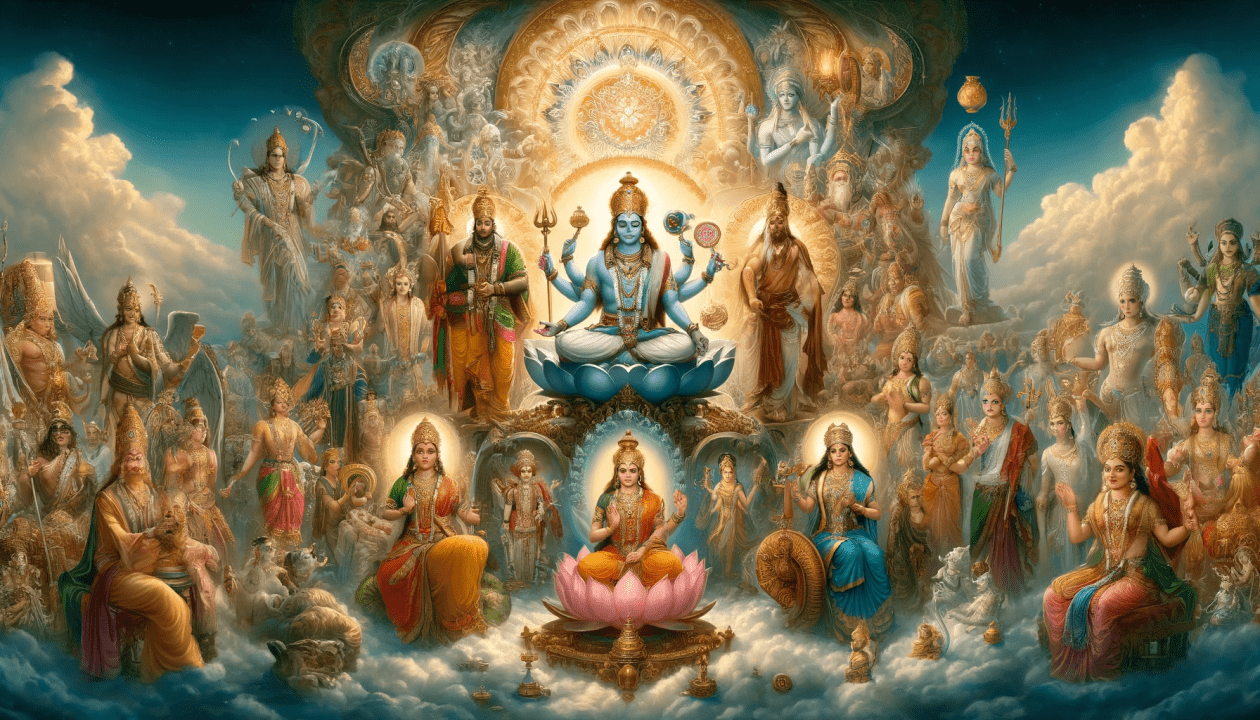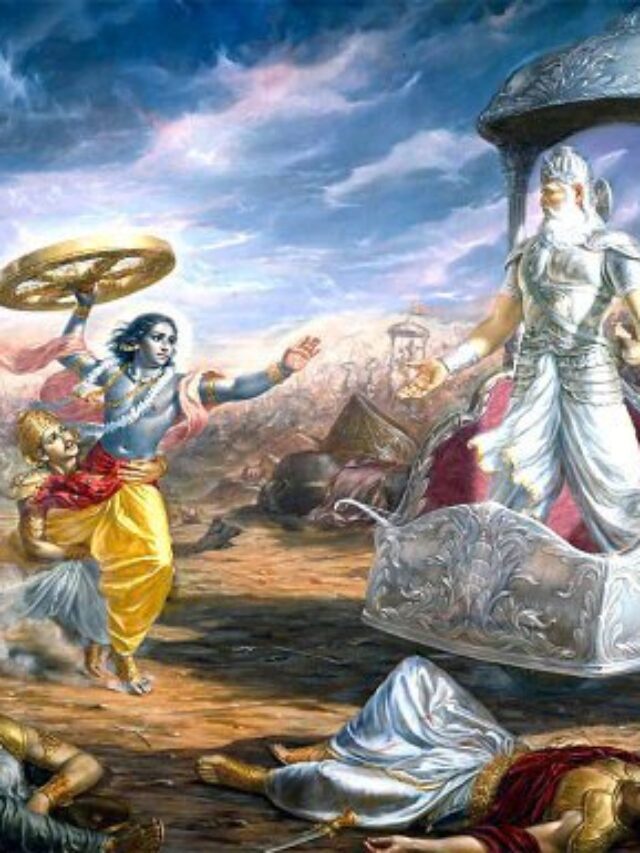

The second chapter of the Shrimad Bhagwat Mahapurana serves as a continuation of the philosophical and spiritual dialogues introduced in the first chapter. This chapter is significant for its focus on the nature of the divine, the importance of Bhakti (devotion), and the eternal truth that governs the universe. The teachings that unfold in this chapter are crucial for understanding the deeper aspects of Lord Krishna’s divine nature, the relationship between the material and spiritual worlds, and the path to spiritual liberation.
Table of Contents
The Setting of the Second Adhyaya:
The second chapter continues the conversation between King Parikshit and Sage Sukadeva. After the king had heard about the impending curse on him and his decision to focus on the spiritual path during his final days, he seeks answers to his existential questions. In this chapter, Parikshit asks Sukadeva to enlighten him about the nature of God, the purpose of human life, and the path to salvation.
Sukadeva, an enlightened sage and Vyasa’s son, begins his discourse by describing the importance of devotion to God and how such devotion leads to the realization of the divine truth. Sukadeva’s teachings establish the tone of the entire Bhagwat Mahapurana, emphasizing that Bhakti is the simplest and most accessible way to connect with the supreme divinity and achieve liberation from the cycle of birth and death.
The Nature of the Supreme Divine:
One of the central themes of the second chapter is the nature of God. Sukadeva begins by explaining that Lord Vishnu, the Supreme Being, is the ultimate cause of creation, preservation, and destruction in the universe. However, Vishnu is not merely a distant, impersonal force; He is a personal deity who manifests in various forms, including the avatars of Krishna, Rama, and others. The essence of God is both immanent and transcendent, present in all things while also existing beyond the material realm.
Sukadeva stresses that the material world is but an expression of the divine will. Everything in the universe, from the smallest atom to the vast cosmos, is created and sustained by the divine energy of Lord Vishnu. The world operates through a perfect balance of natural laws, all of which are part of His divine plan. Even in the midst of apparent chaos and suffering, the presence of the divine is always there, governing and guiding the course of events.
Lord Vishnu, as described in this chapter, is eternal and beyond birth and death. His divine incarnations (avatars) are manifestations of His supreme will, meant to restore cosmic order and protect righteousness (Dharma). The incarnation of Lord Krishna, in particular, is highlighted as the most complete and divine form of Vishnu, who descends to earth to perform miraculous acts and impart divine teachings to humanity.
The Concept of Bhakti (Devotion):
A key theme in this chapter is the concept of Bhakti, which is defined as complete and selfless devotion to God. Sukadeva explains that while there are various paths to spiritual liberation, such as knowledge (Jnana) and meditation (Dhyana), the path of Bhakti is the most accessible and effective for all beings, regardless of their background or station in life. Bhakti involves surrendering oneself completely to God, with no desire for personal gain or material benefits.
The second Adhyaya describes how true devotion is marked by qualities like humility, compassion, patience, and faith. It is not about rituals, sacrifices, or outward displays of piety; rather, it is about cultivating an inner relationship with the divine. This devotion must be free from ego, attachment, and material desires. The devotee must surrender themselves to the will of God, accepting whatever comes their way as a result of divine will.
Sukadeva compares the state of the devotee to that of a child who lovingly depends on their parents. Just as a child is completely reliant on the care and protection of the parents, the devotee surrenders their will to God, trusting that the divine will provide for them and guide them towards liberation.
The Role of Lord Krishna in the Universe:
Sukadeva also emphasizes the special role of Lord Krishna, who is considered the most complete and perfect form of God. While Lord Vishnu is the Supreme Being, Krishna’s incarnation is uniquely beloved by all, as He is both divine and human. Through His actions, teachings, and divine pastimes, Lord Krishna demonstrates the ideal path of devotion and surrender.
The second chapter of the Bhagwat Mahapurana introduces Krishna as not just a god to be worshipped, but as a personal deity with whom devotees can form a loving and intimate relationship. Krishna’s life on Earth, including His miracles, interactions with His devotees, and teachings, exemplifies the qualities of divine love, compassion, and protection. He is portrayed as a friend, a lover, a guide, and a protector, offering solace and guidance to those who turn to Him in devotion.
Krishna’s role as the ultimate teacher is illustrated by His discourse in the Bhagavad Gita, a part of the Mahabharata, where He imparts spiritual wisdom to the warrior Arjuna on the battlefield. This teaching, which will be expounded upon in later chapters of the Bhagwat Mahapurana, is essential for understanding the nature of the soul, the duties of life, and the ultimate purpose of human existence.
The Importance of Listening to Divine Knowledge:
An important part of this chapter is the role of divine knowledge in the spiritual journey. Sukadeva explains that simply listening to the stories of God and the teachings of the scriptures can purify the heart and mind of a devotee. By hearing about the divine exploits of Lord Vishnu and His avatars, the devotee develops a deeper connection to the divine.
Listening to the Shrimad Bhagwat Mahapurana is said to have a transformative effect on the mind and soul, as it removes the impurities of the heart and increases spiritual wisdom. The Bhagwat Mahapurana is not just a historical or mythological account; it is a living scripture that offers timeless teachings for the seeker on the path to liberation.
Conclusion and Reflection on Devotion:
The second Adhyaya of the Shrimad Bhagwat Mahapurana is a profound exploration of the nature of God and the significance of Bhakti (devotion) in spiritual life. Through the teachings of Sukadeva, Parikshit learns that the ultimate goal of life is not the accumulation of wealth, power, or material achievements but the cultivation of a deep, loving relationship with God.
The chapter beautifully illustrates that devotion, surrender, and love for the divine are the keys to transcending the limitations of the material world and attaining spiritual liberation. In the midst of life’s challenges and uncertainties, the path of devotion offers a simple yet profound way to find peace, purpose, and ultimate fulfillment.
Through this chapter, we are reminded that the true nature of God is beyond human comprehension, but through Bhakti, we can experience the divine presence in our lives, transforming our hearts and leading us to a higher state of consciousness. The second Adhyaya lays the foundation for the teachings to follow, inviting us to embark on a spiritual journey centered around love, devotion, and surrender to the divine.



